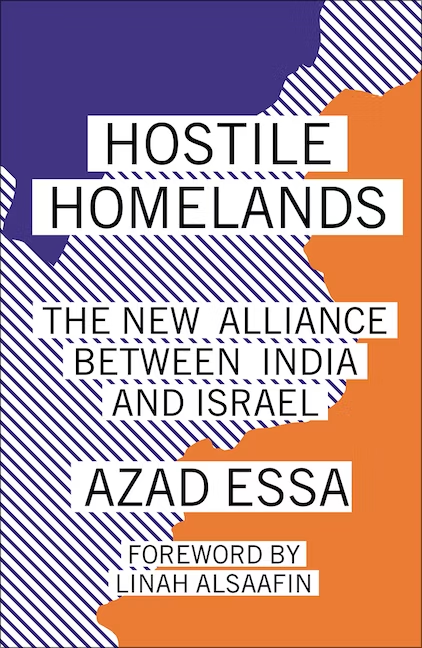By Abeer Salman and Hadas Gold, CNN
Sat May 27, 2023

Israeli police take security measures at the town of Mugayyir in Ramallah, West Bank on May 26, 2023.
JerusalemCNN —
Israeli settler attacks on Palestinians in the West Bank Friday left a man in critical condition and drew international condemnation, including from the US.
Settlers on Friday attacked local farmers and set cars and farms alight near the villages of Turmosayia and Al Mughayyer north of Ramallah, eyewitnesses told CNN and local journalists.
One man remains in critical condition in the hospital on Saturday, having been shot in the head, according to the Palestinian Ministry of Health. Eight others were injured.
“We are deeply concerned by the rising trend of extremist settler violence, including reports of attacks against Palestinians in homes and farms in which they have lived for decades,” the US State Department said in a statement. “We unequivocally condemn all acts of extremist violence, whether Israeli or Palestinian.”
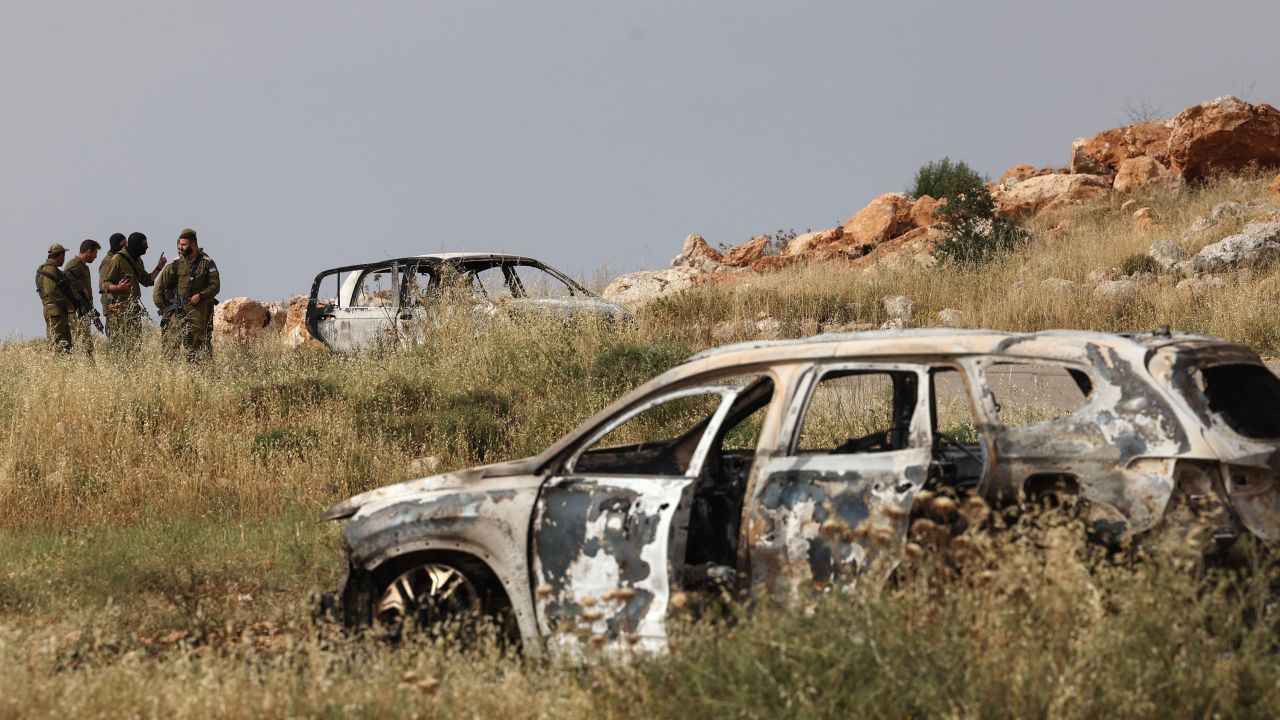
Israeli soldiers stand next to a car, reportedly burnt by Israeli settlers, in the village of Al-Mughayer, east of the occupied West Bank city of Ramallah on May 26, 2023.
In a statement to CNN, the Israel Defense Forces (IDF) – which enforces security in the Israeli-occupied West Bank – acknowledged that Palestinian cars were set alight and said Israeli security forces attempted to disperse “the confrontation.”
But the IDF also blamed both sides for the incident and said both Israelis and Palestinians were injured. “A violent confrontation was instigated in the Shilo Valley, involving Palestinians and Israeli civilians,” the IDF said. “The confrontation involved mutual stone-hurling and Israeli civilians firing into the air.”
Speaking with Israeli Army Radio, an unnamed Israeli security official said that the Israeli government would work to bring the perpetrators “to justice.”
“These are a handful of criminals who are agitating the area, harming security and bringing a bad name to the entire settlement in Judea and Samaria,” the official said, using the biblical name that some Israeli Jews use to refer to the West Bank.
The European Union diplomatic mission to the Palestinians called on the Israeli government to “take decisive steps to ensure accountability and protect the Palestinian civilian population.”
The US State Department also condemned a reported attempted stabbing Friday of an Israeli in a settlement south of Hebron, also in the West Bank. The alleged assailant in that incident, 28-year-old Alaa Khalil Qaisiyah, was shot dead.
CHUTZPAH
Pictures| IOF Force Palestinian Family to Demolish Their House, Pay Fine
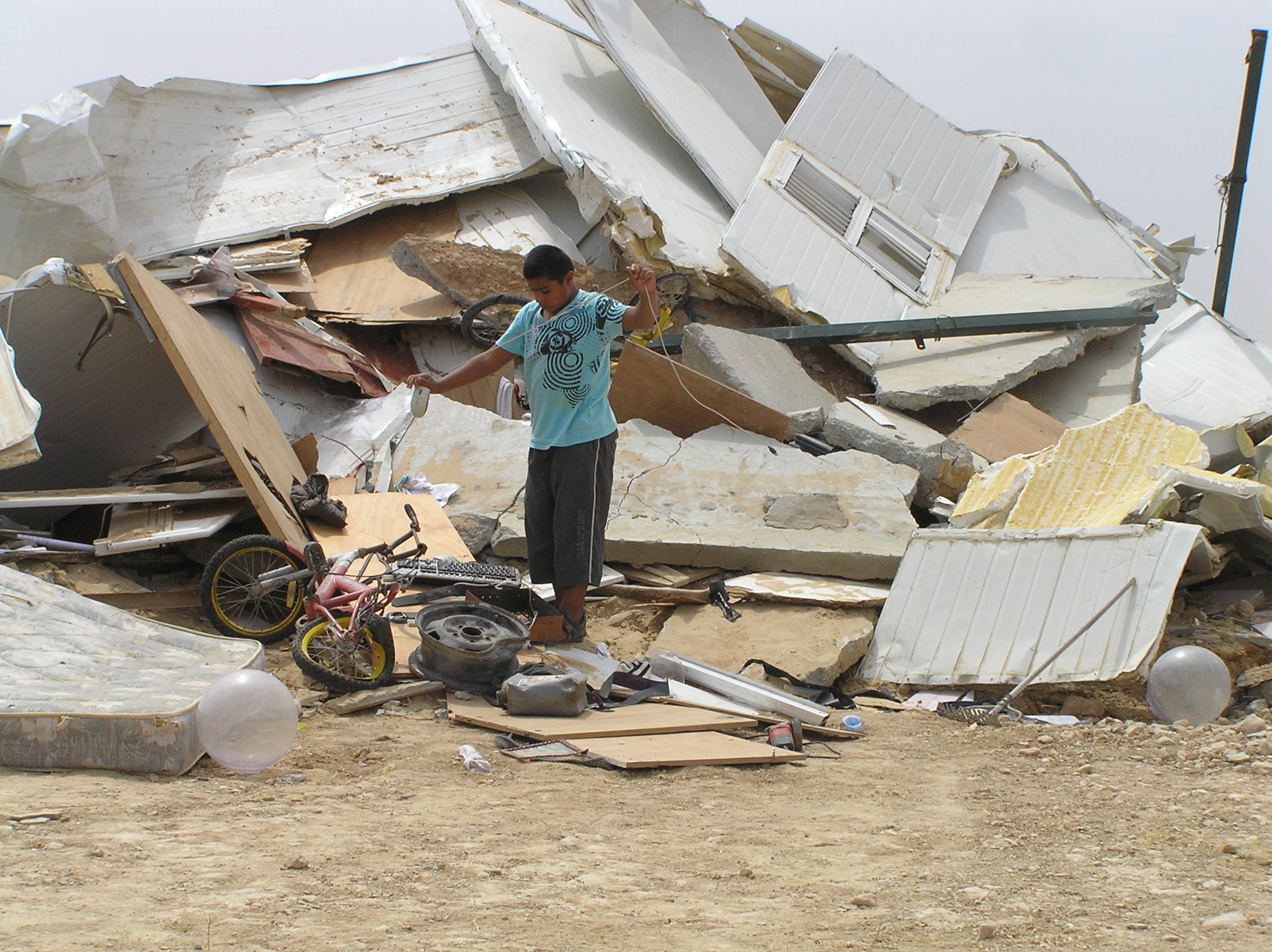
Israeli occupation forces (IOF) forced Saturday, May 27, 2023, a Palestinian family to self-demolish a part of their home in occupied Jerusalem and pay a fine.
Local Palestinian sources reported that Israeli forces forced the Jeruslamite Shaludi family to demolish the roof of the kitchen in their house and pay a fine of 5,000 shekels (1350$).
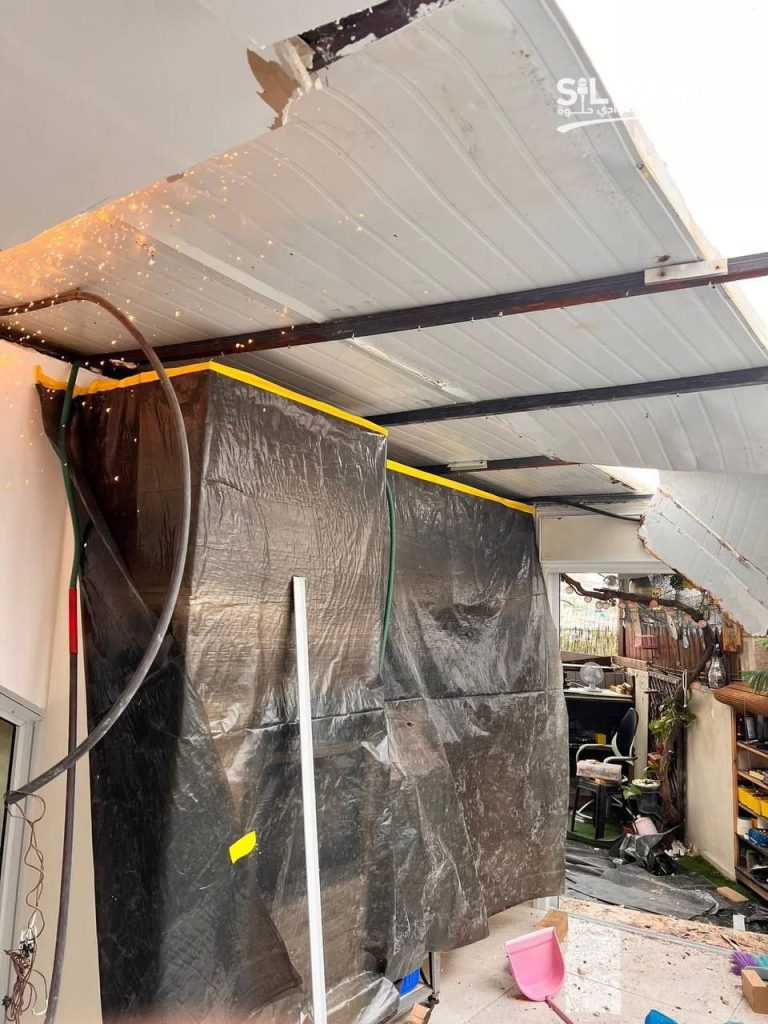
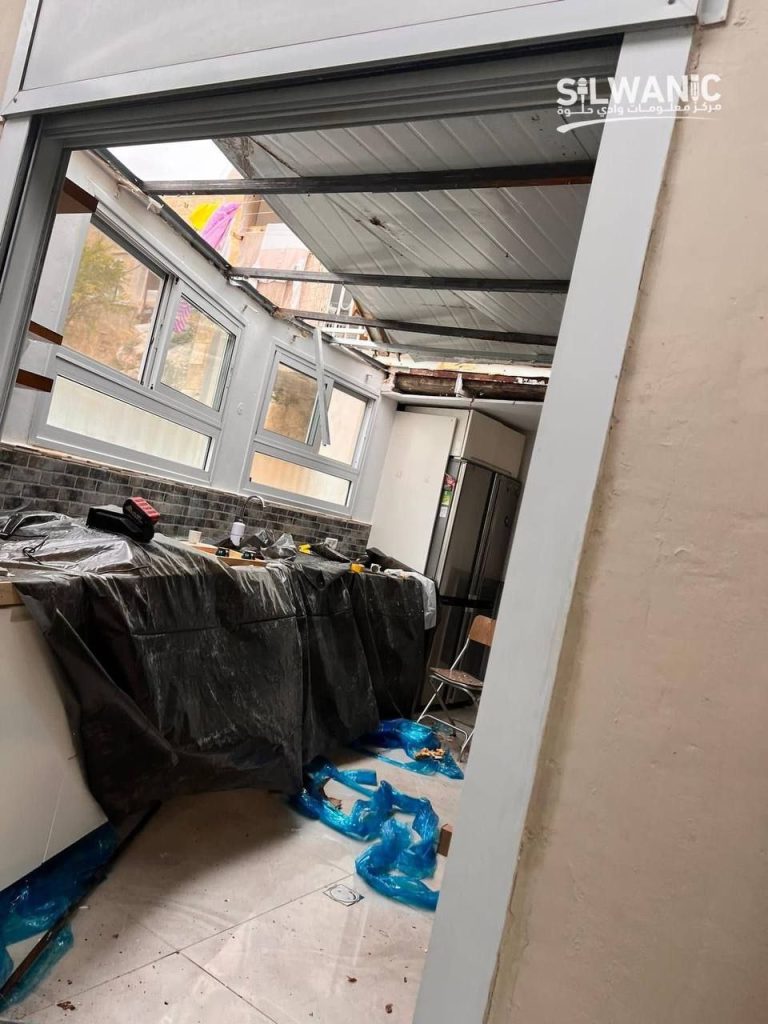
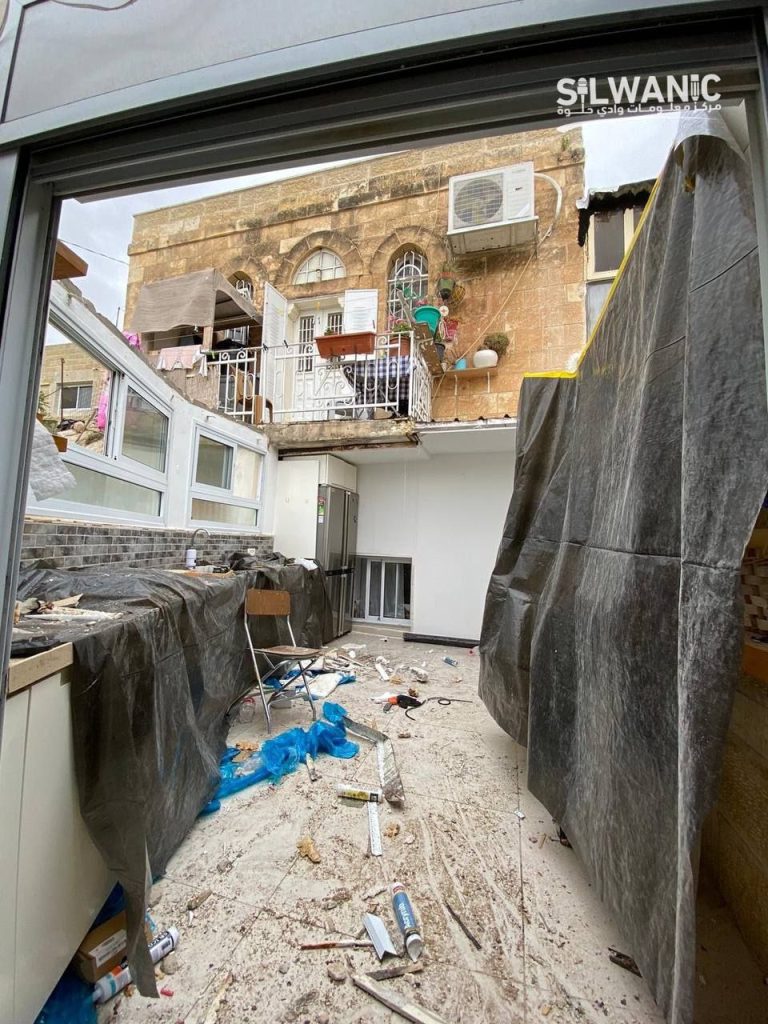
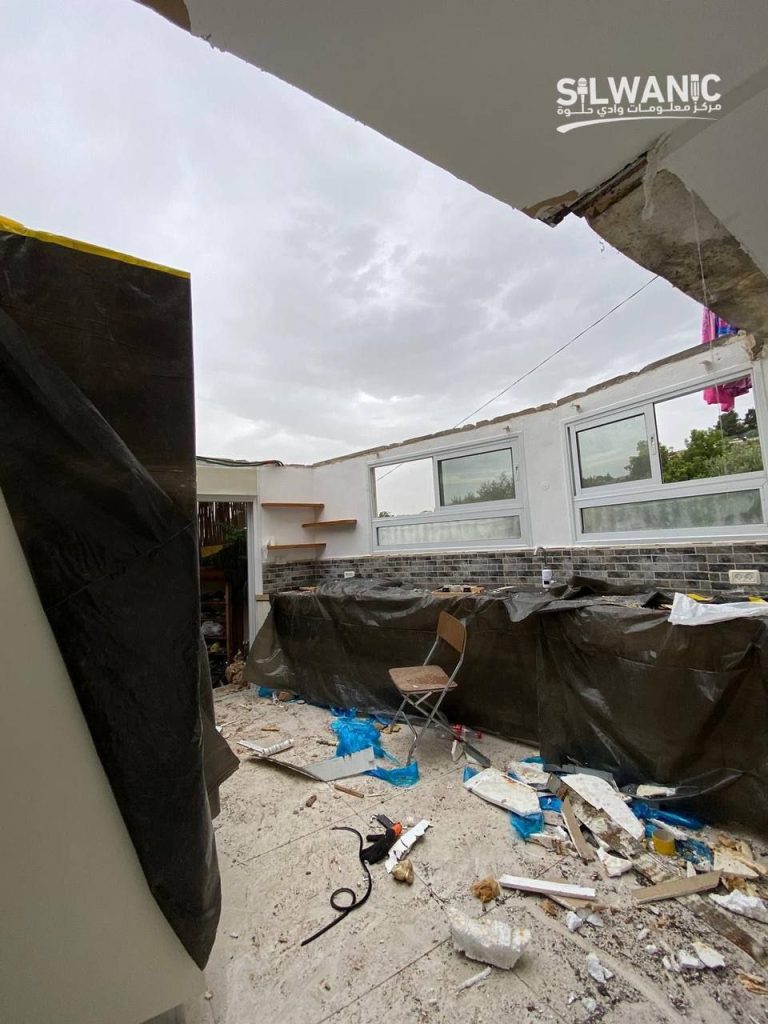
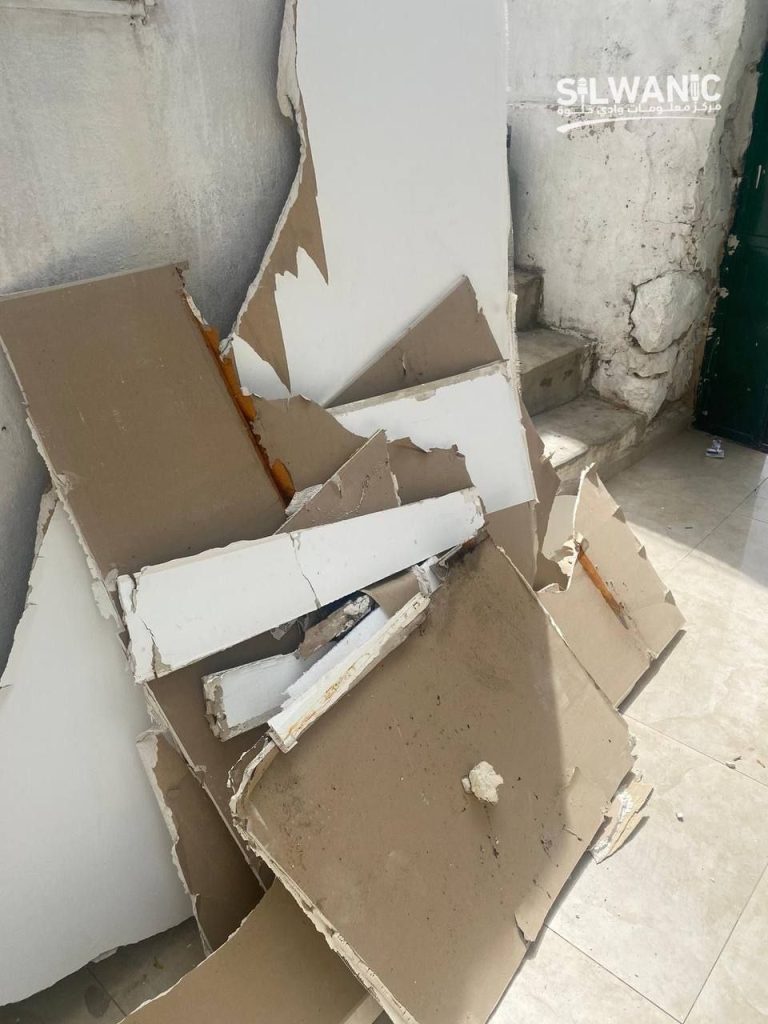
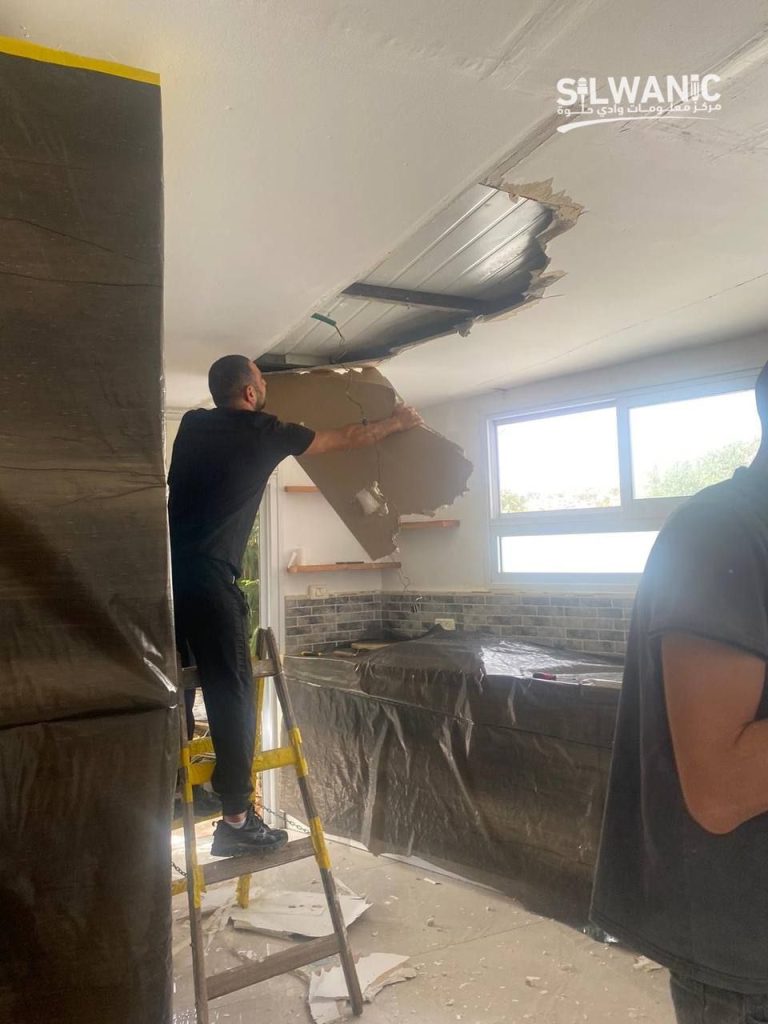
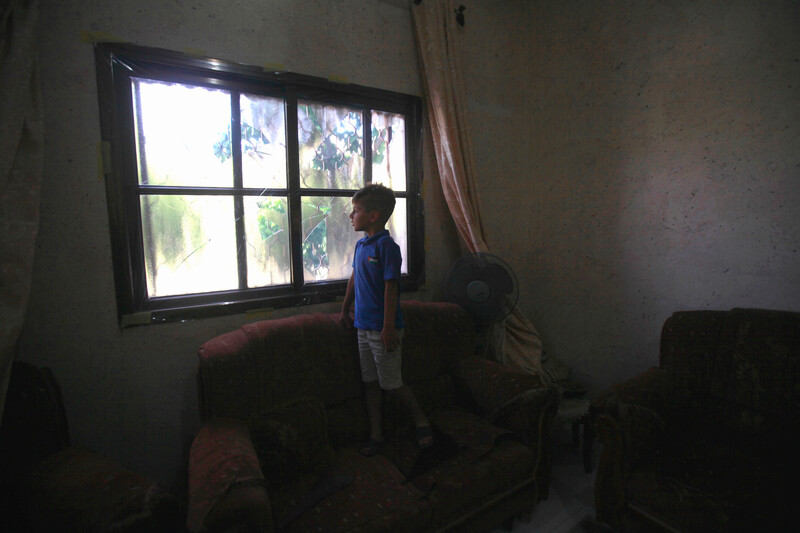
A broken window at a home in Burqa village, near the northern West Bank city of Nablus, after it was attacked by settlers, 25 May. Mohammed NasserAPA images
A spike in fatalities, increased settler attacks against Palestinian communities, moves to further restrict the political rights of Palestinians on both sides of the Green Line, a revival of the assassination of Palestinian faction leaders: five months into its existence, Benjamin Netanyahu’s coalition government, however fragile and fractious, is delivering on its hard-line agenda.
None of these policies are new, of course. But with Israel’s most openly extremist government yet, and third states providing for an environment of near total impunity, the situation on the ground for Palestinians has become ever more dangerous.
This week, the Israeli government passed a budget that, in the words of Al Jazeera, “solidifies the ruling coalition’s religious, pro-settlement agenda” for the next two years.
After weeks of negotiations, the budget was passed after a promise of $68 million was made to Itamar Ben-Gvir’s extreme-right Jewish Power party for settlements in the Naqab and Galilee regions – areas in Israel populated by Palestinians.
As the Associated Press reports, the budget also allocates “nearly $4 billion in discretionary funds, much of it for ultra-Orthodox and pro-settler parties.”
This will allow “hard-line pro-settler parties to promote pet projects through the ministries they control.”
It emboldens figures like Bezalel Smotrich, Israel’s finance minister, who has ordered the government to prepare for the doubling of the number of settlers in the West Bank, presenting his plans as a “core mission” for the present government.
On Thursday, settlers in the northern West Bank began leveling land ahead of construction in Homesh, an outpost near the northern West Bank city of Nablus built on privately owned land belonging to Palestinians in Burqa village.
The land leveling commenced one day after settlers accompanied by soldiers invaded Burqa, burning several homes. The Israeli anti-settlement group Peace Now said on Thursday that the groundwork “is the direct result of the pogrom that took place yesterday … yet again, a clear example of a criminal government serving the settlers.”
As the latest visit to Burqa underscores, these visits do absolutely nothing to protect Palestinians.
Violent friction
Homesh, first built as a military base on land belonging to Palestinians in Burqa in 1978, was evacuated in 2005 as part of then-Prime Minister Ariel Sharon’s unilateral withdrawal from Gaza.
As Oren Ziv writes for +972 Magazine, “the Israeli logic behind originally dismantling Homesh … was that it was an isolated community surrounded by Palestinian villages and cities which required more resources than it was strategically worth.”
Despite the withdrawal nearly 20 years ago, settlers maintained a presence at the outpost, causing violent friction between Palestinians and Israeli settlers.
Ziv adds that between 2017 and 2021, the Israeli human rights group Yesh Din, which petitioned Israel’s high court on behalf of Palestinian residents, “documented 27 settler attacks in the Homesh area, including both physical bodily violence and property damage.”
In August 2021, settlers from Homesh abducted and tortured a 15-year-old Palestinian boy, hitting him with their car and tying him to the vehicle before beating him and roping him to a tree in an isolated area, where they “sprayed him with pepper spray, electrocuted him, and then burned him with the car’s cigarette lighter,” according to +972 Magazine.
Rampaging settlers terrorized Qaryut, a nearby Palestinian village, after a settler was shot and killed in late 2021 while driving away from a religious school that continued to operate in Homesh.
Palestinians in communities near Homesh have also been killed and injured by the Israeli military. In March 2022, Ahmad Hikmat Seif, 23, succumbed to injuries sustained during a protest in solidarity with Palestinian prisoners in Burqa.
Dozens of Palestinians were injured by rubber-coated bullets and tear gas fired by the military in April last year, when thousands of Jews, including several Israeli lawmakers, among them Smotrich, marched to Homesh.
The Tel Aviv daily Haaretz notes that following the killing of the settler in late 2021, Homesh “effectively [became] a fortified army base,” with some 80 soldiers guarding 30 settlers.
In March this year, Israel’s parliament paved the way to formally recognize Homesh, along with several other outposts, despite opposition by the Biden administration in Washington, which says that a settlement at the site between Nablus and Jenin would prevent a contiguous Palestinian state.
Israel insists that it is moving Homesh from private land to what it says is state land – in other words, land that is de facto annexed in violation of international law. Israeli officials admitted to their US counterparts that the move “was in response to domestic political constraints and to prevent Netanyahu’s radical right-wing coalition partners from destabilizing the government,” the online publication Axios reported.
Haaretz observes that the supposedly “state-owned plots are not contiguous and surrounded by Palestinian-owned land.”
Thus, even if the Homesh religious school “is moved to state-owned land, the Palestinians are not expected to be able to get access to their land” and the relocation “would risk greater friction between the two sides than has been the case so far.”
Farmers attacked near Ramallah
Following their ineffectual visit, European diplomats condemned the settler attack on Burqa this week, as well as a similar assault on Palestinian farmers near Ramallah on Friday.
During Friday’s attack, a Palestinian man was shot in the head and seriously injured, according to WAFA, the official Palestinian news agency.
Under the protection of Israeli troops, settlers burned several vehicles belonging to farmers as well as 270 bales of hay.
“These families are not leaving by choice; the Israeli authorities have repeatedly demolished homes and other structures they own and have threatened to destroy their only school,” Yvonne Helle, the UN’s acting humanitarian coordinator for the West Bank and Gaza, said on Thursday.
“At the same time, land available for the grazing of livestock has decreased due to settlement expansion and both children and adults have been subjected to settler violence,” Helle added.
“We are witnessing the tragic consequences of long standing Israeli practices and settler violence.”
Nearly 30 Palestinian families left the rural village, their home for more than 40 years, “after months of escalating Israeli violence,” Basel Adra reported for +972 Magazine.
“Residents say they were compelled to leave after a fierce spate of violence over the previous five days, during which settlers attacked them at night, blocked the roads to the village, and threw stones at the old homes,” according to Adra.
“The mental toll of the attacks, especially on the children, was the decisive factor in the residents’ choice to destroy the village and move away.”
While worsened in recent days, settler harassment and physical violence against Palestinians in Ein Samiya predates the current Israeli government.
“Before this, settlers would come at night, parking their cars at the entrance to the village. They blocked us from getting in or out, and they beat anyone who walked on the road,” Hazem Ka’abneh, a resident of Ein Samiya, told +972 Magazine.
Israel denied residents building permits and destroyed homes when villagers would construct them anyways. Palestinians in Ein Samiya were not connected to basic services like water and electricity, unlike Jews living in nearby settlement outposts unauthorized by the Israeli government.
As Francesca Albanese, the UN special rapporteur on human rights in the West Bank and Gaza Strip, stated on Thursday, the West Bank “continues to be vandalized, torched, robbed inch by inch, its people brutalized day after day.”
And the arsonists heading the Israeli government are fueling the fire, working in tandem with the settlers to push Palestinians off of their land.
